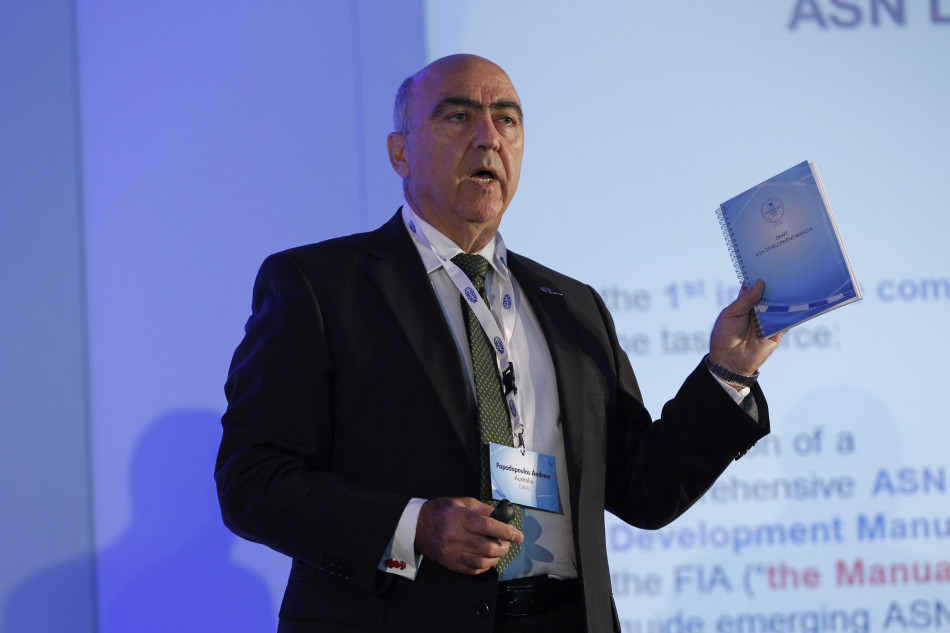Developing success

The FIA yesterday launched its Draft ASN Development Manual ahead of a wide-ranging discussion centred on the building blocks required by ASNs to ensure sustained success.
Andrew Papadopoulos, President of the Development Task Force, first explained the aims of the body and its new reference source.
“The aim of the Task Force is to provide a training programme and relevant tools for support, so that the ASNs are not on their own in attacking the issues that arise in day-to-day management, both in the organisational sphere and also in government and sustainability, which is an area that is becoming more prominent in our sport.”
Referencing the Development Manual he said: “There are a lot of ASNs that are well developed but there are many that are nearly there or just starting. We wanted to establish a reference manual in which we cover most of the issues that affect ASNs on a daily basis.”
Papadopoulos and Task Force Deputy Chairman Colin Hilton then outlined how the manual is structured around four key building blocks for the establishment and running of a successful ASN, with Papadopoulos highlighting structure and event organisation and Hilton pointing to the need for solid licensing, training and sport development.
Commenting on the need for sport development, FIA Deputy President for Sport Graham Stoker told delegates that the FIA needs to be in line with other major sports organisations.
“It was evident to us that all major international federations are involved in sport development. Conspicuous by its absence was the FIA and we needed to address that,” he said. “From my time at the MSA I was aware that a number of ASNs run development programmes. So the expertise was there within ASNs, it was a question of tapping into it.”
Tackling the first building block of structure, Christian Schacht of the Deutscher Motor Sport Bund (DMSB) told delegates that the German ASN has structured itself around two guiding principles – solid management and service provision.
“Motor sport is so complex that you need to have deep knowledge, and it would be impossible to run in a country like Germany with only volunteers, you need to have a strong management team,” he said. “Delivery of service to our customers isparamount. We consider our officials and our competitors to be our customers – it’s a business.”
Dealing with block two, safety, Carlos Abella of Spain’s Real Federación Española de Automovilismo (RFEDA) said for his organisation the running of safe events is a prime motivation.
“We are working every day towards safe events and the way to do this is to constantly update systems and protocols,” he said.
Outlining how his ASN has succeeded in delivering safety, Abella said that at the end of the 1970s Spain lacked a single high-quality circuit but that now the country has a dozen, with seven being FIA homologated.
Jacques Berger, Head of the FIA’s Safety Department, added that the Federation is undertaking initiatives to improve safety at all levels, through the establishment of an accident database and through research into an affordable accident data acquisition system.
With regard to training, ATCUAE’s Sean O’Connor explained how the ASN adopted a wholly regional approach to establishing a development path, with research into the profile of local officials forming a key part of its training strategy. Referencing the ASN’s partnership with the University of Ulster, O’Connor brought in Dr David Hassan who explained that research undertaken at the 2012 Abu Dhabi Grand Prix revealed most volunteers were college educated professionals. Knowledge of this demographic, he said, allowed organisers to target volunteers with initiatives designed to encourage them to repeat their voluntary work.
Finally Ben Taylor explained the MSA’s approach to sport development. He outlined a three-pronged plan, focused on infrastructural support, growth of participation, whereby campaigns are put in place to inform the public about grassroots motor sport and finally international success, whereby raising a young talent to the highest level has a knock-on effect in encouraging further participation.

 Facebook
Facebook Twitter
Twitter






